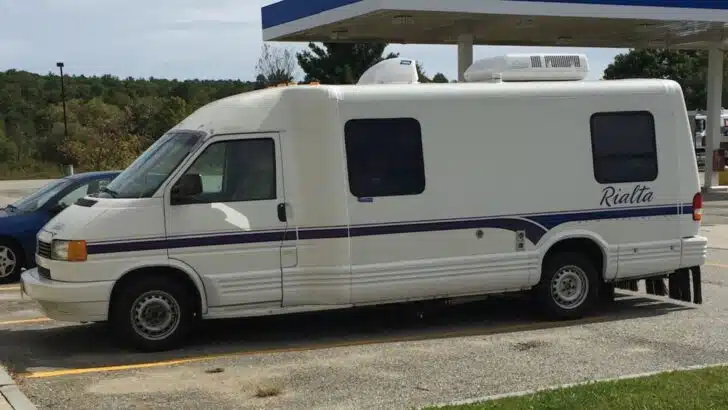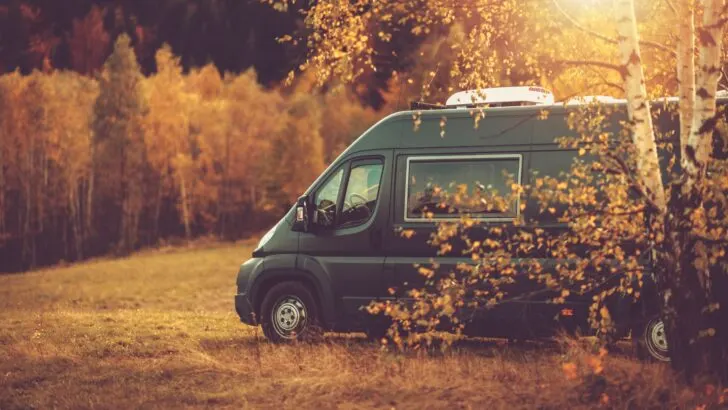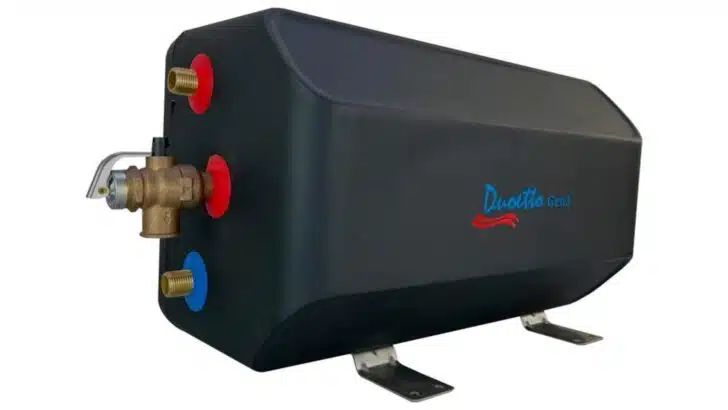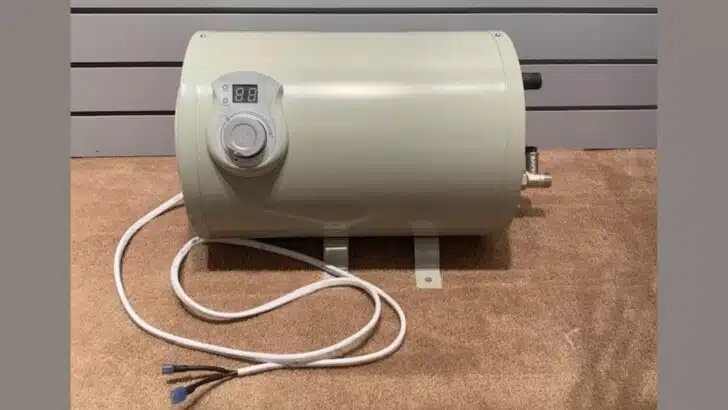We’ve written about getting hot water on an RV before, including our post on RV tankless water heaters and our complete guide to the RV water heater. In today’s post, we’re looking at a far less common way to bring hot water to your RV — the 12-volt RV water heater.
Let’s start with a clarification: Virtually all RV water heaters require 12V DC power to run their electronics and/or power their igniter. However, they use a different energy source to actually heat the water (typically 120V AC electric, propane, or diesel).
What we’re talking about in today’s post is something different — small water heaters that use only 12V DC power to heat the water in an RV.
What Is a 12 Volt RV Water Heater?
As we noted above, a 12-volt water heater for RV use runs only on 12V DC, both to power the electronics and heat the water. 12V hot water is more commonly found in marine applications as opposed to the RV world, but we’re starting to see some 12V water heaters in the RVs too, especially in DIY camper vans.
12-volt units are generally smaller than traditional RV water heaters. That’s one reason that may be more common in smaller RVs like van conversions, truck campers, etc. You may even hear them referred to as 12V campervan water heaters.
The use of marine water heaters in RVs isn’t a new concept. The Winnebago Rialta, made from 1995 to 2005, had a 4-gallon marine water heater made by Atwood that used hot engine coolant to heat the water. Winnebago called this feature “Motor Aid.” Even though those water heaters ran primarily on 120V AC, when Rialta owners reached their destination after driving, they had hot water generated by the Motor Aid system.

The Winnebago Rialta had a hot water system known as “Motor Aid” that used the vehicle’s coolant to heat water while the rig is underway.
There’s no propane used to heat water in a Rialta, and no adjustable thermostat either. The small 4-gallon marine water heaters had the temperature pre-set at the factory and it couldn’t be changed.
The marine-type water heaters we’re talking about today are all 12V electric all the time, including a boost from the engine’s alternator. (More on that below.)
First, let’s take a look at the pros and cons and what you’ll want to keep in mind when considering a 12-volt RV water heater.
Pros, Cons, and What to Look For In a 12-Volt RV Water Heater
A 12V water heater requires sufficient 12-volt power to not only run the electronics but also to heat the water. Some of these small units have features that make them especially appropriate for RV use.
12-Volt RV Water Heater Pros
Following are some benefits of having a 12V water heater in an RV and some of the top features you’ll want to look for when considering one.
Mixing Valves
12V RV water heaters often have valves to mix the heated water with incoming cold water. By heating the water higher than typical water heaters and then bringing it down to a safe temperature with mixing valves, a 3-gallon heater may be able to provide as much as 6 gallons of water that’s still warm enough for a couple of showers. This is important since 12V water heaters generally have small tanks.
No Additional Fuel Source Required
12V water heaters require nothing but 12V DC power to do their jobs. Almost all other RV water heaters require an additional source of power, either 120V AC power provided by a shore power connection or propane or diesel fuel.
Some RVers prefer to avoid carrying propane or diesel, choosing to use 12V or 120V power exclusively. They may cook on an induction cooktop, or an Instant Pot, for example. They could benefit from having a 12V water heater, provided they have enough 12V power to run it.
Power From the Engine’s Alternator
Some 12V water heaters can heat while you’re driving by using power from the engine’s alternator. This means that you’re not depleting the batteries while using their stored 12-volt power to heat your water. You’ll also have hot water when you arrive at your destination.
Well-Insulated
Most 12V heaters are very well insulated to maintain water temperature. The purpose, of course, is to avoid having to reheat the water in the tank every time you need it, by keeping it warm as long as possible once it’s been heated.
Compact
12V water heaters tend to be small, so they fit more easily into even very compact campers. This is why one of the most common places to find a 12V water heater is in a van conversion.

Due to the compact size of 12V water heaters, they’re especially useful in small campervan conversions.
12-Volt RV Water Heater Cons
There are a few drawbacks to keep in mind when considering a 12 volt water heater for RV use.
12V Water Heaters are Small
While the compact nature of 12V water heaters can be an advantage, it can also be a drawback. Three or four gallons of hot water isn’t a lot, particularly if more than one or two people are showering, even using water-saving RV boondocking techniques. Even if mixing valves are used, the result can still be a smaller amount of usable hot water than many RVers are used to.
Slow Heating
12V heaters warm water more slowly than those using other methods (propane, 120V AC, or diesel fuel). This means waiting longer for hot water. Some models have a heating time of 30-45 mins, depending on cold water temperature and tank size. But as we mentioned above, arriving at your destination with a tank of water already heated by the alternator is a plus on travel days.
Requires a Larger Battery Bank and/or Engine Use
A primary concern where 12V water heaters are concerned is the considerable battery bank required to heat water and run everything else in the rig that requires 12V power. You’ll need a fairly substantial battery bank if you’re going to run a water heater on 12V power.
Again, if you’ve been driving for a while you’ll have hot water upon arrival at your destination. But there’s a limit to how long that water will stay hot despite the well-insulated tank. Maybe adjust your routine to include showering upon arrival at a new destination?
Larger Gauge Wiring Required
If you’re planning to retrofit a 12V RV water heater in place of an existing unit, you’ll likely need to increase the size of the wiring supplying 12V power, as well as increase the size of the fuse protecting the circuit. Since standard RV water heater options rely on 12V power for low amp draw functions (like powering the control circuits and supplying spark to ignite the fuel), the existing factory wiring won’t be able to handle the current flow required for a 12V heating element. Plan to run new wiring to accomodate the power requirements of the water heater.
Few 12 Volt Water Heater Options Available
There aren’t a lot of strictly 12V water heaters available so your options may be limited. But with solar becoming a more popular feature on RVs, this may change over time. 12V water heaters might become more common, just as 12V RV refrigerators, 12V RV ceiling fans, and 12V TV sets have become more popular.
12-Volt RV Water Heaters
Following are a few 12V water heaters for RV use on the market today. Note that these are generally produced for marine use but have been used successfully in the RV space, particularly in innovative van conversions with solar arrays.
Whale S360EW 3-Gal 12V Water Heater
The Whale S360EW is a 3-gallon (11-liter) 12V water heater with safety features such as low current switching, an integrated temperature and pressure valve, thermal cut-out, and heating output with ignition protection. This unit requires 30-amps of 12V DC current when heating.
The compact design of the Whale S360EW means it fits well even in very small spaces and the unit weighs only 14 lbs. It offers “rapid heat-up,” although you should be aware that this equates to an hour or more.
Duoetto Gen3 Dual 12V/120V Water Heater
The 2.65-gallon Gen3 model from Australian supplier Duoetto operates exclusively on 12V DC power when off-grid, or with 120V shore or generator power when available. That can make it a really versatile hot water solution.

The Duoetto Gen3 12-volt water heater will run off your 12V battery power OR 120V shore or generator power. (Photo source: Douetto)
The Duoetto Gen 3 uses advanced anti-corrosion technology. The tank is enamel-coated and made from SPCC steel with polyurethane insulation. It has a variable thermostat (86°-140° F /30°-60°C) with over-temperature and run-dry protection and has automatic voltage detection switching between 12V and 120V. This unit can be either wall- or floor-mounted.
It has a 300W 12V DC heating element which draws approximately 25 amps when heating.
Some RVers use Duoetto’s original 12V/240V unit (linked below) solely for its 12V functionality. But the new Gen3 model includes the option for using 120V shore or generator power, too.
- Dual voltage 12v / 240v
- Variable thermostat 30-75°C on 240v and up to 70°C 12v
Expedition Upfitters 12V Water Boiler
Expedition Upfitters offers a 12-volt water boiler for campers. This is a 1.6-gallon (6-liter) water boiler designed to fit in boats, RVs, or other small vehicles. It has a standard 12-volt hookup and adjustable thermostatic control from roughly 86°F/ 30° C to 167° F/75°C.

This 12V water boiler from Expedition Outfitters has a standard 12-volt hookup and adjustable thermostatic control from roughly 86°F/ 30° C to 167° F/75°C. (Photo source: Expedition Outfitters)
This 12V water heater is equipped with overheating protection, anti-backflow, and electricity leakage protection, as well as a safety valve set to avoid overpressure. It’s hand and pressure pump capable, (though you’ll need a pump that operates at less than 68 psi). The 12V DC heating element is listed at 200W, which will require about 15 amps of current to operate.
The tank holds only 1.6 gallons (6 liters) of hot water, however you can increase the amount of warm water by two or three times by using the mixing valves to mix the hot water with cold water. The enamel-coated, anti-corrosion tank is well-insulated with an ultra-thick foam layer inside its steel cover.
Self-Build 12V Water Heater
Some RVers, often those converting vans into RVs, build their own 12V water heaters by modifying/rewiring an existing 120V AC water heater with a small tank.
One RVer known as the Outside Nomad created a DIY 12V water heater for his camper van for around $300. In this post, he notes that it worked great for him for 7 years though he’s now moved on to a Rixen hydronic heating system. (You’ll need to scroll way down on that page to see the DIY system he built.)
For his DIY 12V water heater conversion project, he used a residential Reliance 6-gallon water heater, but there’s now a 2.5-gallon version that some might prefer.
- Point of use electric water heater, 601 series
- No dip tube since the side bottom inlet eliminates need for it
These units are designed to run off 120V AC, so the DIY project involved swapping the heating element for a 12V element. He notes that while he used (and never had a problem with) a 400-watt heating element that draws around 35 amps, others have reported that their thermostat eventually stopped working due to the 35A of current being more than a 120V AC model is designed to use. He suggests that using a 200W or 300W element would likely solve this issue. Alternatively, you could try wiring in a higher amp relay to handle the higher wattage element.
- 12v DC heater connects with batteries, solar panels, hydroelectric generators and wind turbine dump
- 1" NPSM flange fits USA standard water tank or your own custom heater tank
However you choose to integrate a 12V water heater into your RV, you’ll want to be sure you’ve got a sufficient battery bank (preferably with solar) and that you use a tank that’s well insulated for better heat retention. This, and the option of using mixing valves to make your water warm as opposed to hot, can extend your ability to have hot water while boondocking, using nothing but 12V power.
For more information about RV water heaters, check out our complete guide to the RV water heater and our post on the RV tankless water heater.
Free RVing Tips, Tricks, Reviews & Giveaways
As 20-year full-timers, we share everything we’ve learned about RVing over the years. Join our online community to receive a wealth of great RVing knowledge delivered daily to your inbox.
Whether you’re a new RVer or a seasoned full-timer, you’ll love the wide range of RVing topics we cover. Don’t miss a single article or any of our famous Giveaways. Subscribe to our newsletter today!






Larry
Sunday 17th of December 2023
Timely information. Thanks for the details such as amp draw comparisons. Also the inclusion of the 12v heating element available for conversions and diy from scratch. Might want to emphasize the need for a temp/pressure safety relief valve for those diy from scratch projects. Great job guys.
Paul
Sunday 17th of December 2023
Is a heating element still available to be used in a standard gas water heater? For us that use both shore power and boondock it my be a good operation.
TheRVgeeks
Sunday 17th of December 2023
Hi Paul. Yes... many standard, factory-installed RV water heaters come with a 120V AC heating element to augment heating with propane. You can use just the propane heat, just electric heat (i.e. shore power to heat water when at a hookup), or both (heats the water faster and improves the "recovery" time while using a large amount of hot water, like for back-to-back showers).
Now, not all RV manufacturers include a gas-electric model of water heater (some are propane only) in their RVs, but many do.
David
Saturday 16th of December 2023
Interesting article. It left me hungry for more info on the current draw at 12vdc, which, for many RVers, is the big question. You studiously avoided that other than for the homemade versions. The Amazon descriptions are also vague.
TheRVgeeks
Saturday 16th of December 2023
Hi David. Sorry, you're right. That IS important information. It's just not readily provided by the manufacturers! 🤦 We've gone ahead and dug deeper... and updated the article. Hope that helps!